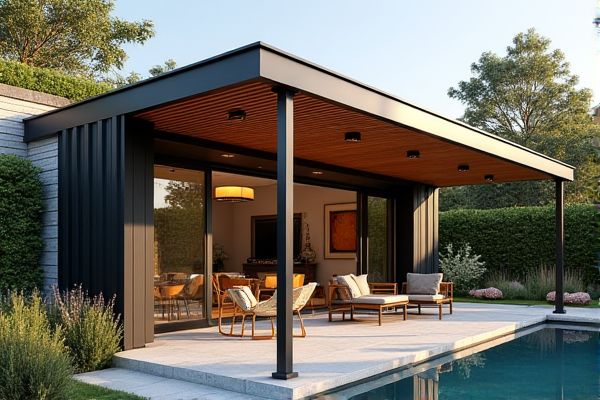
Aluminum pergolas offer durability, low maintenance, and resistance to weather elements, making them ideal for long-lasting outdoor structures, while wooden pergolas provide natural beauty, warmth, and customization options but require regular upkeep to prevent rot and insect damage. Discover which pergola type best suits your outdoor space and lifestyle by reading the rest of the article.
Table of Comparison
| Feature | Aluminum Pergola | Wooden Pergola |
|---|---|---|
| Durability | Highly durable, rust-resistant, withstands weather | Moderate durability, prone to rot and pests without treatment |
| Maintenance | Low maintenance, does not require painting or sealing | High maintenance, requires regular painting, sealing, and treatment |
| Cost | Generally higher initial cost but cost-effective over time | Lower initial cost but higher long-term maintenance expenses |
| Appearance | Modern, sleek, available in various colors and finishes | Natural, warm, classic, customizable with stains and paints |
| Environmental Impact | Recyclable, low environmental footprint if recycled | Renewable resource but requires forestry and chemical treatments |
| Weight | Lightweight, easier installation | Heavier, requires strong support structures |
| Longevity | 20+ years with minimal upkeep | 10-15 years with proper maintenance |
Introduction to Pergolas: Aluminum vs Wooden
Aluminum pergolas offer superior durability, low maintenance, and resistance to rust and insects, making them ideal for long-term outdoor use. Wooden pergolas provide a natural aesthetic with customizable finishes but require regular upkeep to prevent rot, warping, and pest damage. Choosing between aluminum and wooden pergolas depends on balancing longevity and maintenance with style and authenticity.
Material Composition and Durability
Aluminum pergolas are crafted from lightweight, corrosion-resistant metal alloys, providing superior durability against weather elements and minimal maintenance requirements. Wooden pergolas, typically made from cedar, redwood, or pressure-treated pine, offer natural beauty but require regular sealing and treatment to resist rot, insect damage, and warping. Your choice between aluminum and wood hinges on whether you prioritize long-lasting strength and low upkeep or a classic, warm aesthetic.
Aesthetic Appeal and Design Flexibility
Aluminum pergolas offer sleek, modern aesthetics with a variety of powder-coated finishes that resist fading and rust, ensuring long-lasting visual appeal. Wooden pergolas provide natural warmth and organic charm, with customizable stains and intricate carvings that enhance traditional or rustic outdoor spaces. Your choice depends on whether you prefer the contemporary versatility of aluminum or the timeless elegance and design flexibility of wood.
Weather Resistance and Maintenance Needs
Aluminum pergolas excel in weather resistance due to their rust-proof and corrosion-resistant properties, making them highly durable in various climates with minimal maintenance. Wooden pergolas require regular sealing, staining, or painting to protect against moisture, rot, and insect damage, increasing upkeep demands. The low-maintenance nature of aluminum pergolas combined with their long-lasting finish offers a more practical option for environments exposed to harsh weather conditions.
Installation Process and Setup Time
Aluminum pergolas feature lightweight materials and pre-fabricated components that significantly reduce installation time, often enabling completion within a day by DIY enthusiasts or professionals. Wooden pergolas require more preparation, including measuring, cutting, and assembling heavy timber, which extends setup time and often necessitates specialized tools and carpentry skills. The low-maintenance nature and modular design of aluminum pergolas streamline the installation process compared to the labor-intensive setup of wooden structures.
Cost Comparison: Upfront and Long-Term
Aluminum pergolas typically have a higher upfront cost, averaging between $4,000 and $7,000 for standard installations, compared to wooden pergolas, which range from $3,000 to $6,000 depending on the wood type. Long-term expenses favor aluminum due to its low maintenance and resistance to rot, rust, and insect damage, significantly reducing repair and replacement costs over time. Wood pergolas, while initially cheaper, often require regular sealing, staining, and potential repairs, increasing their total cost of ownership over the lifespan.
Eco-Friendliness and Sustainability
Aluminum pergolas offer superior eco-friendliness due to their recyclability and long lifespan, reducing waste and resource consumption over time. Wooden pergolas, while biodegradable and made from renewable resources, require sustainable sourcing to minimize deforestation and environmental impact. Your choice depends on balancing recyclable materials and natural renewability to support a greener outdoor structure.
Customization Options for Outdoor Spaces
Aluminum pergolas offer extensive customization options with sleek, modern designs, powder-coated finishes in various colors, and adjustable louvered roofs for precise shading control. Wooden pergolas provide natural warmth and can be tailored with stain or paint colors, decorative trim, and integrated climbing plants for a rustic aesthetic. Choosing between aluminum and wood depends on your desired style, maintenance preferences, and functional needs for your outdoor space.
Longevity and Warranty Considerations
Aluminum pergolas typically offer superior longevity due to their resistance to rust, corrosion, and insect damage, often lasting 20 years or more with minimal maintenance. Wooden pergolas, while aesthetically appealing, are prone to rot, warping, and pest infestation, generally requiring regular sealing and maintenance to extend their lifespan beyond 10-15 years. Warranties for aluminum pergolas frequently cover structural integrity for 10-15 years, whereas wooden pergola warranties are usually shorter, often limited to 1-5 years, reflecting their higher vulnerability to environmental factors.
Choosing the Right Pergola for Your Home
Aluminum pergolas offer superior durability, low maintenance, and resistance to weather and pests, making them ideal for homeowners seeking long-lasting outdoor structures. Wooden pergolas provide natural beauty, customizable design options, and a warm aesthetic that complements traditional and rustic home styles. Selecting the right pergola depends on balancing factors such as budget, desired appearance, maintenance willingness, and climate resilience.
 homyna.com
homyna.com